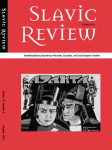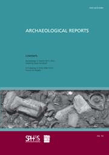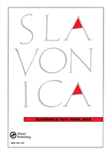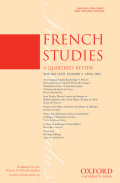
Byzantinoslavica-Revue Internationale des Etudes Byzantines
Scope & Guideline
Exploring the Depths of Byzantine and Slavic Heritage
Introduction
Aims and Scopes
- Interdisciplinary Studies of Byzantine Culture:
The journal focuses on the cultural, religious, and political dimensions of the Byzantine Empire, exploring its impact on neighboring regions, particularly Slavic cultures. - Linguistic and Philological Analysis:
Byzantinoslavica emphasizes the study of Byzantine texts and manuscripts, including translations and linguistic developments within the Byzantine and Slavic contexts. - Historical Contextualization:
The journal aims to contextualize Byzantine history within broader European and Asian historical narratives, examining events and figures that shaped the Empire's legacy. - Art and Architecture of Byzantium:
Research on Byzantine art, architecture, and iconography is a core area, reflecting on how these elements were interpreted and adapted in post-Byzantine cultures. - Thematic Studies on Byzantine Influence:
Byzantinoslavica publishes thematic studies that analyze the diffusion of Byzantine ideas, practices, and materials across different cultures, especially in the Balkans.
Trending and Emerging
- Interconnections between Byzantium and Slavic Cultures:
There is a notable increase in studies examining the cultural, religious, and political exchanges between Byzantium and its Slavic neighbors, highlighting the nuanced interactions and mutual influences. - Digital Humanities in Byzantine Studies:
The use of digital tools for analyzing Byzantine texts and artifacts is on the rise, reflecting a broader trend in academia towards integrating technology in research. - Reassessment of Byzantine Legacy in Modern Contexts:
Emerging themes focus on how Byzantine history and culture are perceived in modern times, particularly in relation to contemporary national identities and cultural heritage. - Manuscript Studies and Textual Criticism:
An increase in the analysis of Byzantine manuscripts, including linguistic studies and textual criticism, indicates a growing interest in the preservation and interpretation of primary sources. - The Role of Women in Byzantine Society:
Research highlighting the roles and contributions of women in Byzantine society is gaining prominence, reflecting a broader trend in historical scholarship towards gender studies.
Declining or Waning
- Traditional Historical Narratives:
There seems to be a decline in papers focusing solely on conventional historical narratives of Byzantium, as researchers increasingly look for interdisciplinary and thematic approaches that incorporate broader contexts. - Purely Archaeological Studies:
Research that focuses exclusively on archaeological findings without integrating textual or cultural analysis is less prevalent, indicating a shift towards more holistic methodologies. - Narrow National Histories:
Papers that concentrate solely on national histories of Byzantine influence in specific countries are declining, suggesting a move towards more comparative and transnational studies.
Similar Journals

Jahrbuch der Oesterreichischen Byzantinistik
Advancing Byzantine scholarship with every issue.Jahrbuch der Oesterreichischen Byzantinistik, published by the esteemed Österreichische Akademie der Wissenschaften, is a vital academic journal dedicated to advancing the study of Byzantine studies, history, and related fields. Situated in Austria, this journal serves as a critical platform for scholars and researchers, offering a rich collection of articles that reflect the diverse aspects of Byzantine culture, literature, and archaeological findings. Despite its recent categorization in the Q4 quartile in areas such as Archaeology, History, and Literary Theory, it commands impressive rankings within Scopus, particularly in Literature and Literary Theory at the 87th percentile, highlighting its growing impact in the arts and humanities. Researchers and professionals can access comprehensive studies that span from 2010 to 2018 and continue from 2020 to 2023, paving the way for interdisciplinary dialogue and exploration within the Byzantine field. As a continually evolving resource, the Jahrbuch is essential for those committed to deepening their understanding of this historically rich domain.

Vizantiiskii Vremennik
Illuminating the Legacy of a Timeless EmpireVizantiiskii Vremennik is a prestigious academic journal dedicated to the field of Byzantine studies, published by the esteemed ROSSIISKAYA AKAD NAUK, IZDATELSTVO NAUKA. With its ISSN 0132-3776, this journal serves as a vital platform for scholarly discourse, exploring the rich historical, cultural, and artistic legacy of the Byzantine Empire. Despite the absence of open access options, Vizantiiskii Vremennik provides valuable insights through meticulously peer-reviewed articles, making it essential reading for researchers, historians, and students engaged in classical studies and related disciplines. The journal prides itself on fostering a deeper understanding of Byzantine civilization, promoting interdisciplinary approaches, and contributing to the broader research community dedicated to this pivotal era in history. The publication's commitment to high academic standards ensures its importance in the scholarly landscape, making it a recommended source for anyone pursuing knowledge in this influential field.

SLAVIC REVIEW
Advancing Knowledge in Slavic Cultural and Social Dimensions.SLAVIC REVIEW, published by Cambridge University Press, is a prominent academic journal that delves into the rich tapestry of Slavic studies, focusing on the cultural, historical, and social dimensions of Slavic regions. With an ISSN of 0037-6779 and an E-ISSN of 2325-7784, this journal holds a significant position within the academic community, ranking in the Q2 category of Arts and Humanities (miscellaneous) and achieving a Q1 rating in Cultural Studies as of 2023. Notably, the journal has consistent relevance in the field, as evidenced by its Scopus rankings—Rank #260 in Cultural Studies and Rank #204 in Miscellaneous Arts and Humanities. Since its converged years starting from 1966 up to the present, SLAVIC REVIEW has been an essential resource for researchers, professionals, and students aiming to deepen their understanding of Slavic cultures. While it operates on a traditional subscription model and does not provide open access, the journal remains a vital platform for pioneering research and critical discourse in Slavic studies.

Slavia Meridionalis
Advancing interdisciplinary scholarship in Slavic studies.Slavia Meridionalis is a distinguished open-access journal published by the Polish Academy of Sciences, Institute of Slavic Studies, dedicated to advancing scholarly discourse in the fields of Anthropology, Cultural Studies, History, Linguistics and Language, and Literature and Literary Theory. With its ISSN 1233-6173 and E-ISSN 2392-2400, this journal has made significant strides in promoting research since its inception in 2014. Operating from Warsaw, Poland, Slavia Meridionalis aims to serve as a pivotal platform for researchers and students alike, fostering interdisciplinary collaboration and knowledge dissemination. The journal holds respectable rankings in its various categories, some achieving Q3 status, which reflects its commitment to quality scholarship within the academic community. By providing open access to its readership, Slavia Meridionalis ensures that pivotal research is readily available for the global audience, thus enhancing its relevance and impact across diverse fields.

Deltion of the Christian Archaeological Society
Championing Research that Connects the Dots of History and BeliefDeltion of the Christian Archaeological Society (ISSN: 1105-5758, E-ISSN: 2241-2190), published by the Christian Archaeological Society in Athens, Greece, stands as a pivotal source of scholarly work within the realm of Christian archaeology. This journal is dedicated to disseminating high-quality research that promotes the understanding of Christian history, heritage, and archaeological practices. Though it operates under traditional access options, it provides a comprehensive platform for researchers and professionals alike, fostering dialogue and collaboration within the archaeological community. With a commitment to advancing knowledge, the Deltion aims to support both established scholars and emerging voices, reinforcing the significance of archaeology in interpreting religious narratives and cultural contexts. Researchers, students, and professionals interested in the intersections of archaeology, history, and theology will find this journal an invaluable resource in their scholarly pursuits.

Archaeological Reports-London
Pioneering Research in the Heart of ArchaeologyArchaeological Reports-London, published by Cambridge University Press, is a prominent journal dedicated to advancing the field of archaeology, encompassing a comprehensive range of studies that delve into the rich tapestry of human history from prehistory to modern times. With an ISSN of 0570-6084 and an E-ISSN of 2041-4102, this journal has been a significant source of scholarly articles since its inception in 1955, serving as a crucial platform for researchers and academics alike. The journal is categorized in the third quartile for Archaeology and Arts and Humanities, and holds a prestigious position in the first quartile for Classics, reflecting its vital role in the scholarly community. With its esteemed ranking of Rank #45/170 in Classics and Rank #210/413 in Archaeology, it provides unparalleled insights and findings that shape contemporary archaeological discourse. Although not an open-access publication, the journal remains key for those who seek to enrich their understanding of archaeological practices and heritage conservation. Engage with Archaeological Reports-London to explore cutting-edge research that illuminates our understanding of past civilizations and informs future directions in the field.

SLAVONICA
Advancing Scholarship in Slavic StudiesSLAVONICA is a distinguished academic journal dedicated to the exploration and analysis of Slavic studies, incorporating a wide array of cultural, historical, and linguistic perspectives. Published by Routledge Journals, Taylor & Francis Ltd, this journal serves as a critical platform for interdisciplinary scholarship, emphasizing the dynamic nature of Slavic cultures and languages. Though it currently does not offer Open Access, SLAVONICA is an important resource for researchers, professionals, and students seeking to engage with the latest academic discourse in the fields of Cultural Studies, History, Literature, and Linguistics, achieving a recognized place in the Q4 quartile across several categories as of 2023. With coverage spanning from 1994 to 2024, and its commitment to fostering academic inquiry, SLAVONICA plays a vital role in elevating the understanding of Slavic heritage and contemporary issues, making it essential reading for anyone interested in the complexities of this region.

OLBA
Empowering Researchers to Discover the UnseenOLBA is a distinguished journal in the field of archaeology, published by Mersin University Publications Research Center Cilician Archaeology in Turkey. With an ISSN of 1301-7667, this academic journal has been a platform for scholarly discourse from 2009 to 2014 and again from 2016 to 2019, with a recent volume published in 2022. Although it is currently categorized in the fourth quartile (Q4) for both Arts and Humanities and Social Sciences within archaeology, OLBA continues to contribute significantly to the global archaeology community. It serves as an essential resource for researchers, professionals, and students interested in the diverse aspects of archaeological studies and cultural heritage. Despite not being an open-access journal, OLBA strives to disseminate knowledge effectively, aiding in the exploration of ancient civilizations and the rich tapestry of human history. Its Scopus rankings, placing it in the bottom percentiles, demonstrate the ongoing need for the community to support and engage with the journal to enhance its visibility and impact in the archaeological domain.

FRENCH STUDIES
Advancing Interdisciplinary Insights in French StudiesFRENCH STUDIES is a premier academic journal published by Oxford University Press, dedicated to advancing the fields of Cultural Studies, History, Linguistics, and Literature. Established in 1947, the journal has become a significant platform for interdisciplinary research, reflecting on the complexity and richness of French cultural and literary heritage. With an impact factor that positions it in Quartiles Q2 and Q3 across various categories, including Literature and Literary Theory, FRENCH STUDIES is recognized for its scholarly contributions and insights into historical narratives, linguistic developments, and cultural analyses. The journal does not currently offer open access options, yet it remains an essential resource for researchers, professionals, and students seeking to deepen their understanding of French studies and its global implications. The journal's commitment to quality and intellectual rigor is evidenced through its Scopus rankings, making it a valuable asset for the academic community in the United Kingdom and beyond.

Konstantinove Listy-Constantines Letters
Elevating the study of history, philosophy, and religion to new heights.Konstantinove Listy - Constantines Letters is a premier academic journal published by the Constantine Philosopher University in Nitra, Slovakia. With a focus on the interdisciplinary exploration of historical, philosophical, and religious studies, this journal has established itself as a significant platform for scholarly discourse since its inception in 2015. The journal's impressive rankings—Q1 in History and Religious Studies, along with Q2 in Philosophy—demonstrate its commitment to high-quality research, concurrent with its strong performance in Scopus rankings, placing it in the 80th percentile for both Religious Studies and History disciplines. As an integral part of the academic landscape, Konstantinove Listy invites researchers, professionals, and students alike to contribute to its mission of advancing knowledge and understanding in these vital fields. While the journal operates under traditional publishing, it is recognized for its accessibility and contribution to fostering a vibrant scholarly community.